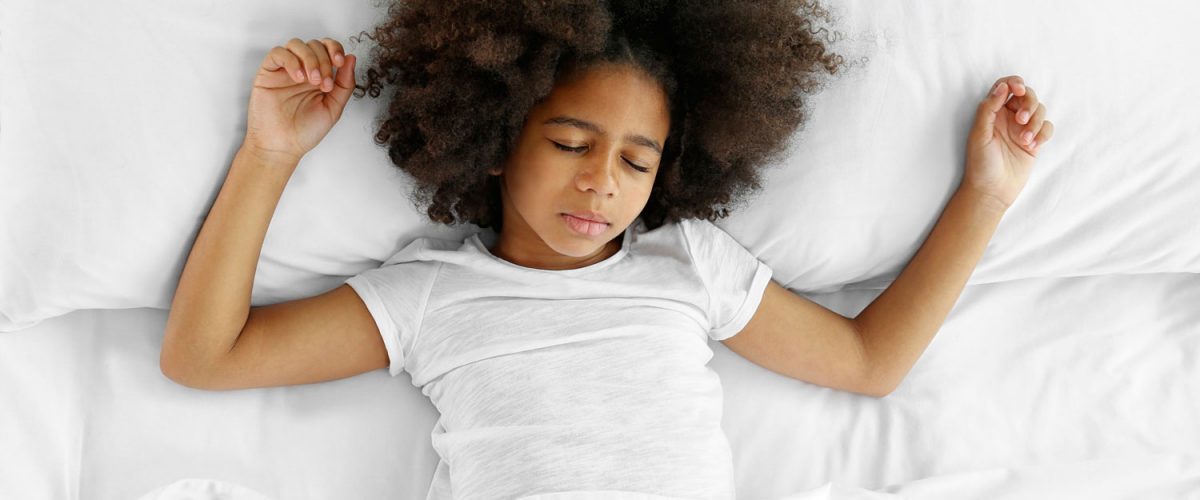By Virginia Gurley, MD, MPH
MB (Marc Braman, MD, MPH):
This session we’re talking about kids and sleep basics. Welcome back, Dr. Gurley.
VG (Virginia Gurley, MD, MPH):
Thank you, Dr. Braman.
MB:
Now, kids, I mean, they’re young, they’re resilient – do they really need sleep that much?
VG:
Yes, like adults, more and more research is demonstrating the critical role sleep plays in nearly every aspect of health and well-being. The major research findings on the effects of too little or poor quality sleep on the health of children are related to metabolism and obesity, learning and attention disorders, and anxiety and mood disorders.
MB:
Ok, so that sounds like an awful lot. Maybe we’ll touch on some of those. How much is enough or the right amount?
VG:
Well, most parents know their kids need more sleep than they do, but many don’t know how much more sleep kids need and how important sleep is for their long-term health and well-being.
So, infants and toddlers should get at least 12-14 hours of sleep a night; preschoolers through 6 years of age should get at least 12-13 hours; and then school age kids should get at least 10-11 hours and teens should get at least 9-10 hours of sleep at night.
MB:
Wow!
VG:
Yeah, it’s a lot more than most kids actually get.
And research has found that children between 4 – 6 years old that sleep less than 10.5 hours per night have a 4 times greater risk of developing obesity by the age of 15 years of age.
MB:
Wow, that’s huge.
VG:
It’s huge.
And, kids also have an increased risk for obesity if they have a condition called sleep disordered breathing which is a condition where breathing during sleep is either too slow or too shallow, and this is a whole separate risk factor for insufficient sleep affecting health.
MB:
So, a big connection with obesity. How does sleep produce obesity? How is it connected?
VG:
Well, it’s not clear yet how short sleep contributes to obesity in children, but similar to adults, one theory is that short sleep increases hunger and the hormones that control appetite and the desire for calorie dense foods. And, so, if they’re eating more, they’re going to weigh more.
MB:
Ok, that would make sense. Now, you mentioned some other things like Attention Deficit Disorder. I think we all recognize that when kids get tired, especially little kids, they get rowdy, they get fussy, they’re hard to manage. So ADHD looks a lot like being tired. Are these two really that much alike?
VG:
More and more, the research is suggesting that ADHD, it could actually be a symptom of insufficient or poor quality sleep. So, the research is quite new but it really does seem that they’re very closely related, if not actually poor sleep being the cause or at least a key underlying cause.
MB:
Wow, so important to keep in mind. What about mood – anxiety, depression. What’s the relationship there?
VG:
The studies looking at the connection between not enough sleep and anxiety have mostly focused on adolescents, and here, teens with too little sleep are at least 2 times more likely to experience very high levels of anxiety and then for that anxiety to progress, over time, as they continue through adolescence into full blown clinical depression. So, very strong connection.
MB:
So we’re talking about major connections with really important issues here.
VG:
Yes.
MB:
What advice can you share with parents for managing their kids sleep?
VG:
Well, enforcing age appropriate bedtimes is not high on most parents’ list of favorite aspects of parenting.
MB:
I’ll raise my hand.
VG:
Yeah, but it certainly is very important and something very critical for your role as a parent and one approach that can make getting your child to enjoy going to bed especially in the younger years is to dedicate the 20 minutes or so before lights out to relaxing activities that they’ll enjoy like reading stories aloud, singing lullabies, or giving your child a gentle back rub.
But, another critical aid to getting your child to sleep on time and with good quality is making sure there are no screens in the bedroom at night ever – so that means no TV, no gaming devices, no phones, smart phones, small phones, none of that because research is showing that when kids have any of these devices in their bedroom, their sleep time is significantly shorter.
MB:
Wow, that last one, again, I’ll raise my hand. It’s going to be a challenging one for many of us.
VG:
Yep.
MB:
But, wonderful information, very effective and important information. If we want happier, calmer, smarter, trimmer kids…sleep is probably one of the best places to start.
Thank you so much, Dr. Gurley.
VG:
Thank you, Dr. Braman.
Sleep patterns and obesity in childhood. Miller AL, Lumeng JC, LeBourgeois MK. Curr Opin Endocrinol Diabetes Obes.. 2015 Feb;22(1):41-47. doi: 10.1097/MED.0000000000000125.
Sleep and the epidemic of obesity in children and adults. Van Cauter E, Knutson KL. Eur J Endocrinol. 2008 Dec;159 Suppl 1:S59-66. doi: 10.1530/EJE-08-0298.
Sleep-disordered breathing, sleep duration, and childhood overweight: a longitudinal cohort study.Bonuck K, Chervin RD, Howe LD. J Pediatr. 2015 Mar;166(3):632-9. doi: 10.1016/j.jpeds.2014.11.001.
Short sleep duration in prevalent and persistent psychological distress in young adults: the DRIVE study. Glozier N, Martiniuk A, Patton G, Ivers R, Li Q, Hickie I, Senserrick T, Woodward M, Norton R, Stevenson M. Sleep.2010 Sep;33(9):1139-45.
The SENSE Study (Sleep and Education: learning New Skills Early): a community cognitive-behavioural therapy and mindfulness-based sleep intervention to prevent depression and improve cardiac health in adolescence. Waloszek JM, Schwartz O, Simmons JG, Blake M, Blake L, Murray G, Raniti M, Dahl RE, O’Brien-Simpson N, Dudgeon P, Trinder J, Allen NB. BMC Psychol. 2015 Nov 4;3:39. doi: 10.1186/s40359-015-0096-x.





